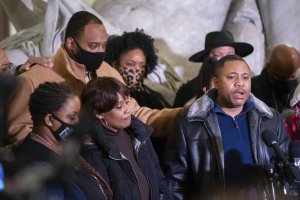By Steve Karnowski and Amy Forliti
The Associated Press
The Minneapolis mayor imposed a moratorium on no-knock warrants Feb. 4, two days after a SWAT team entered a downtown apartment and killed Amir Locke, a 22-year-old Black man who his parents said was “executed” after he was startled from a deep sleep and reached for a legal firearm to protect himself.
Mayor Jacob Frey said while the moratorium is in place, he and police leadership will review and revise department policy with the help of two experts who helped shape Breonna’s Law, the ban on no-knock warrants that was imposed in Louisville, Kentucky, following the death of Breonna Taylor in a botched raid at her home in 2020.
“No matter what information comes to light, it won’t change the fact that Amir Locke’s life was cut short,” Frey said in a statement.
Locke’s parents, Andre Locke and Karen Wells, described him Feb. 4 as respectful, including to police, and said some of their relatives work in law enforcement. Wells said the couple coached their son on how to act and do “what they needed to do whenever they encountered police officers” because of the danger to “unarmed Black males.”
“My son was executed on 2/2 of 22,” Wells said. “And now his dreams have been destroyed.”
The parents spoke at a news conference organized by civil rights attorney Ben Crump, who said Locke’s family was “just flabbergasted at the fact that Amir was killed in this way” and disgusted at how the Wednesday morning raid was conducted. They said he was law-abiding, with no criminal record, and had a permit to carry a gun.
“They didn’t even give him a chance,” Crump said, adding that it was shocking that Minneapolis police had not learned from Taylor’s death, which led to calls for an end to no-knock warrants nationwide.
Police said Locke pointed a loaded gun “in the direction of officers.” An incident report said he had two wounds in the chest and one in the right wrist.
The killing prompted outrage in Minneapolis, where prominent activists confronted the mayor and interim police chief at a news conference Feb. 3. Nekima Levy Armstrong, a civil rights attorney, called the city’s release of information “the anatomy of a cover-up.”
Gov. Tim Walz called Locke’s death “a tragedy” and said it showed the need for further examination of no-knock warrants.
Frey’s office said DeRay McKesson, a prominent activist, and Peter Kraska, a professor at the School of Justice Studies at Eastern Kentucky University, will work with the police department on possible changes to policy. Frey’s office said both men helped shape Breonna’s Law in Louisville and have spearheaded changes to unannounced entry policies nationwide.
His office said that under the moratorium, a no-knock warrant can only be used if there is an imminent threat of harm, and even then the warrant must be approved by the chief.
Body camera video released by police Feb. 3 shows an officer using a key to unlock the door of a downtown apartment and enter without knocking, followed by at least four officers in uniform and protective vests, time-stamped at about 6:48 a.m.
After they open the door, they repeatedly shout, “Police, search warrant!” They also shout “Hands!” and “Get on the ground!” The video shows an officer kick a sectional sofa, and Locke, who was wrapped in a comforter on the sofa, begins to move, holding a pistol. Three shots are heard, and the video ends.
The city also released a still from the video showing Locke holding the gun, his trigger finger along the side of the barrel. Otherwise, all that can be seen of Locke is the top of his head.
Levy Armstrong posted a link to the video on social media “for those who can stomach the murderous conduct of the Minneapolis Police Department.” She added: “The mother in me is furious and sick to my stomach. Amir never had a chance to survive that encounter with police.”
Hennepin County Attorney Mike Freeman said he asked Minnesota Attorney General Keith Ellison to help review the case for possible charges. Ellison’s office led prosecutions of former Minneapolis Police Officer Derek Chauvin in George Floyd’s killing and of former Brooklyn Center Officer Kim Potter in the shooting of Black motorist Daunte Wright.
“Amir Locke’s life mattered,” Ellison said in a statement, promising a fair and thorough review “guided by the values of accountability and transparency.”
A gun-rights group highlighted the timing of the raid, saying it appeared from the video that Locke was awakened by a confusing array of commands from officers pointing lights and guns at him.
“Mr. Locke did what many of us might do in the same confusing circumstances, he reached for a legal means of self-defense while he sought to understand what was happening,” said Rob Doar, a spokesman for the Minnesota Gun Owners Caucus.
Interim Police Chief Amelia Huffman said during a news conference Feb. 3 that Locke wasn’t named in the warrants. She said it wasn’t clear how or whether Locke was connected to St. Paul’s homicide investigation. A spokesman for the St. Paul Police Department said he could not comment because the homicide investigation was ongoing.
The search warrants that led the SWAT team to enter the apartment were filed under seal and will not be made public immediately.
Frey said the video “raises about as many questions as it does answers” and that the city was pursuing answers “as quickly as possible and in transparent fashion” through investigations including one by the state Bureau of Criminal Apprehension.
Huffman said the officer, Mark Hanneman, was in a difficult position.
“The still shot shows the image of the firearm in the subject’s hands, at the best possible moment when the lighting was fully on him. That’s the moment when the officer had to make a split-second decision to assess the circumstances and to determine whether he felt like there was an articulable threat, that the threat was of imminent harm, great bodily harm or death, and that he needed to take action right then to protect himself and his partners,” she said.
Hanneman was hired in 2015. Records released by the city showed three complaints, all closed without discipline, but gave no details. Data on the website of the citizen group Communities United Against Police Brutality showed a fourth complaint, in 2018, that remains open. No details were given.
The shooting came as three former Minneapolis officers are on trial in St. Paul on charges that they violated George Floyd’s civil rights. Floyd was among several Black men to die in confrontations with Minneapolis police in recent years, and his death spurred widespread protests and a drive to remake the department. The Department of Justice is currently investigating the Minneapolis Police Department to see if it has a pattern or practice of civil rights violations.
Walz on Feb. 4 authorized the National Guard to provide public safety assistance if needed. His order said it was in response to the city of St. Paul’s request for aid during the trial in that city, but said Guard members would also be ready to serve in Minneapolis if needed due to Locke’s death.
Help us Continue to tell OUR Story and join the AFRO family as a member – subscribers are now members! Join here!
The post Parents: Amir Locke ‘executed’; mayor halts no-knock entries appeared first on AFRO American Newspapers .










